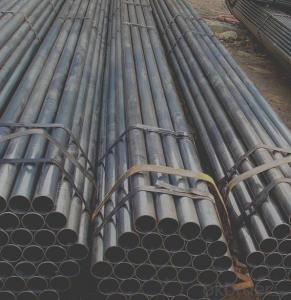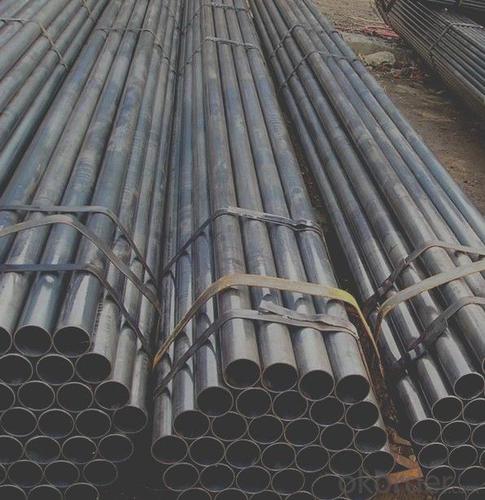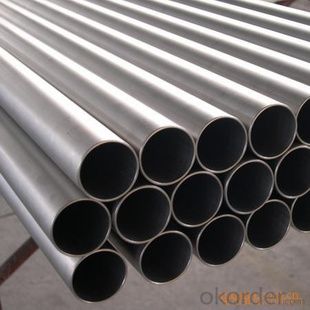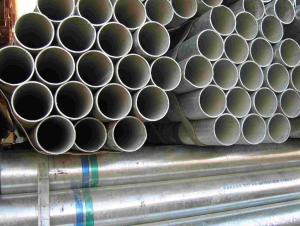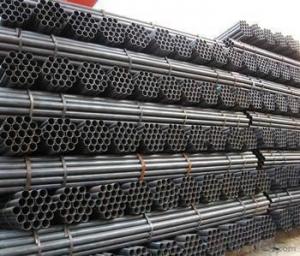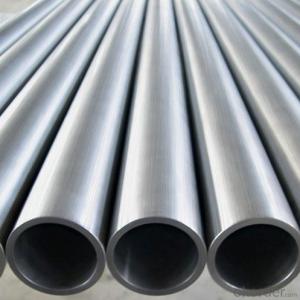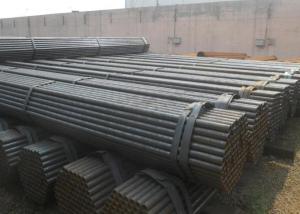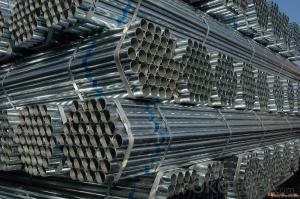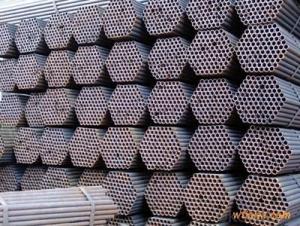ERW Steel Pipe GB9711.1 Water Oil Gas Pipe
- Loading Port:
- Tianjin
- Payment Terms:
- TT OR LC
- Min Order Qty:
- 25 m.t.
- Supply Capability:
- 6000 m.t./month
OKorder Service Pledge
OKorder Financial Service
You Might Also Like
1、High Quanlity Welded ERW Steel Pipe GB9711.1:
GB9711.1 ERW steel pipe is electric resistance welding, the abbreviation for ERW for transporting oil and natural gas vapor liquid objects, can meet the requirements of high and low pressure, the transport in the world with pipe sector accounted for a pivotal position.
2、Main Features of High Quanlity Welded Black ERW Steel Pipe GB9711.1:
• High manufacturing accuracy
• High strength
• Good visual effect
• Reasonable price
• Small inertia resistance
• Strong heat dissipation ability
3、High Quanlity Welded Black ERW Steel Pipe Specification GB9711.1:
Standard | GB, DIN, ASTM ASTM A106-2006, ASTM A53-2007 |
Grade | 10#-45#, 16Mn 10#, 20#, 45#, 16Mn |
Thickness | 1 - 33 mm |
Section Shape | Round |
Outer Diameter | 21 - 610mm |
Place of Origin | Tianjin, China (Mainland) |
Secondary Or Not | Non-secondary |
Application | Hydraulic Pipe |
Technique | Cold Drawn |
Certification | API |
Surface Treatment | factory state or painted black |
Special Pipe | API Pipe |
Alloy Or Not | Non-alloy |
Length | 5-12M |
Outer Diameter | 21.3-610mm |
Grade | 20#, 45#, Q345, API J55, API K55, API L80, API N80, API P110, A53B |
Standard | ASME, ASTM |
1) Material:20#(ASTM A 106/A53 GRB.API5LGRB,GB),45#,16Mn,10#.
2) Specification range:OD:21.3-610mm,WT:6-70mm,length:6-12m or according to the requirement of clients.
3) Excutive standards:GB,ASME API5L.ASTM A 106/A53,Despite of the above standards,we can also supply seamless steel pipe with standard of DIN,JIS,and so on,and also develop new products according to the requirements of our clients!
4) Surface:black lacquered,varnish coating or galvanized.
5) Ends:Beveled or square cut,plastic capped,painted.
6) Packing:bundles wrapped with strong steel strip,seaworthy packing.
4、Packaging & Delivery
Packaging Details: | seaworthy package,bundles wrapped with strong steel strip |
Delivery Detail: | 15-30days after received 30%TT |
5、FAQ of High Quanlity Welded Black ERW Steel Pipe GB9711.1:
①How is the quality of your products?
Our products are manufactured strictly according to national and internaional standard, and we take a test
on every pipe before delivered out. If you want see our quality certifications and all kinds of testing report, please just ask us for it.
Guaranteed: If products’ quality don’t accord to discription as we give or the promise before you place order, we promise 100% refund.
②How about price?
Yes, we are factory and be able to give you lowest price below market one, and we have a policy that “ for saving time and absolutely honest business attitude, we quote as lowest as possible for any customer, and discount can be given according to quantity”,if you like bargain and factory price is not low enough as you think, just don’t waste your time.Please trust the quotation we would give you, it is professional one.
③Why should you chose us?
Chose happens because of quality, then price, We can give you both.Additionally, we can also offer professional products inquiry, products knowledge train(for agents), smooth goods delivery, exellent customer solution proposals.Our service formula: good quality+good price+good service=customer’s trust
SGS test is available, customer inspection before shipping is welcome, third party inspection is no problem.
6、 High Quanlity Welded Black ERW Steel Pipe Images GB9711.1:
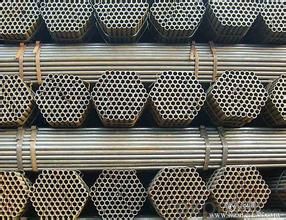
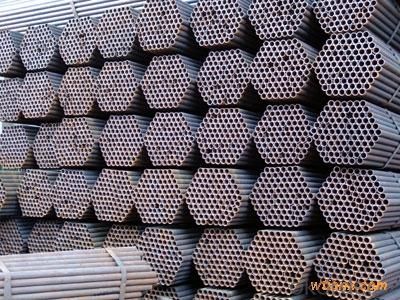
- Q: When can I use the PVC pipe and when to use the galvanized pipe?
- Galvanized pipes are generally used outside the drying environment or building blocks, and PVC is mainly used for pre embedding in walls or humid environments. If in the ceiling ceiling, below the roof, you need to use galvanized pipe, in the floor below, on the ground you need to use PVC.
- Q: Are steel pipes suitable for underground compressed air systems?
- Yes, steel pipes are suitable for underground compressed air systems. Steel pipes are known for their strength and durability, making them capable of withstanding the high pressure and potential corrosion that may occur in underground environments. Additionally, steel pipes are resistant to heat and can efficiently conduct compressed air, making them a reliable choice for such systems.
- Q: Are steel pipes resistant to corrosion?
- Yes, steel pipes are resistant to corrosion due to the protective layer formed by the oxide film on their surface. However, their resistance can vary depending on the specific type of steel and the conditions they are exposed to.
- Q: Are steel pipes suitable for semiconductor manufacturing plants?
- Yes, steel pipes are suitable for semiconductor manufacturing plants. Steel pipes offer several advantages such as high strength, durability, and resistance to corrosion, making them ideal for transporting various fluids and gases used in semiconductor manufacturing processes. Additionally, steel pipes can withstand high pressure and extreme temperatures, ensuring the safe and efficient operation of semiconductor manufacturing plants.
- Q: What are the safety considerations when working with steel pipes?
- When working with steel pipes, safety considerations include wearing appropriate personal protective equipment such as gloves, safety glasses, and steel-toed boots to prevent injuries. It is essential to handle and lift steel pipes using proper techniques and equipment to avoid strains and falls. Ensuring a clean and organized work area, as well as securing pipes to prevent rolling or tipping, reduces the risk of accidents. Additionally, workers should be cautious of sharp edges and ensure proper ventilation when working with welding or cutting tools to minimize the risk of fires or inhalation hazards.
- Q: How are steel pipes used in the manufacturing of oil refineries?
- Steel pipes are essential in the manufacturing of oil refineries as they are used for various purposes such as transporting crude oil, petroleum products, and other fluids throughout the facility. These pipes are used for the construction of pipelines, storage tanks, and various process equipment within the refinery. They provide a reliable and durable means of conveying and distributing fluids necessary for the refining process, ensuring efficient operations and the safe transportation of oil and its byproducts.
- Q: Can steel pipes be used for conveying natural gas?
- Yes, steel pipes can be used for conveying natural gas. Steel pipes have been widely used in the natural gas industry due to their strength, durability, and ability to withstand high pressure. Additionally, steel pipes are resistant to corrosion and provide a secure and reliable method for transporting natural gas over long distances.
- Q: How are steel pipes insulated?
- Steel pipes can be insulated using various methods such as applying insulation materials like foam or fiberglass wraps, using thermal tapes, or employing pre-insulated pipe systems where insulation is integrated into the pipe during manufacturing.
- Q: What is the difference between schedule 10 and schedule 40 steel pipes?
- Schedule 10 and schedule 40 steel pipes differ in terms of their wall thickness. Schedule 10 pipes have a thinner wall, making them suitable for low-pressure applications, while schedule 40 pipes have a thicker wall, making them more appropriate for high-pressure applications.
- Q: How are steel pipes protected against external moisture?
- Steel pipes can be safeguarded against external moisture in various ways. One commonly employed method involves applying a protective coating or paint to the pipe's surface, which acts as a barrier to prevent direct contact with moisture. Depending on the specific requirements and environment, this coating can be composed of different materials like epoxy, polyethylene, or zinc. Another means of protection is through the utilization of corrosion inhibitors. These inhibitors are added to either the internal or external surfaces of the pipes, creating a protective layer that hinders moisture-induced corrosion. Chemicals like rust converters or rust preventatives are examples of corrosion inhibitors that react with the steel, forming a protective barrier. Cathodic protection is an additional technique utilized to shield steel pipes from external moisture. This technique involves the use of sacrificial anodes or impressed current to generate an electric current that safeguards the steel. Sacrificial anodes, typically made of zinc, aluminum, or magnesium, are attached to the steel pipes and corrode over time instead of the steel, thereby preventing moisture-induced corrosion. Moreover, proper insulation and waterproofing measures play a vital role in protecting steel pipes from external moisture. To provide an extra layer of protection and prevent moisture infiltration, insulation materials like foam or tape are applied to the pipes. Waterproofing measures such as sealants or membranes can also be implemented to ensure no moisture seeps into the pipes. Regular maintenance, including inspections and repairs, is crucial for ensuring the continuous protection of steel pipes against external moisture. By promptly addressing any areas of damage or corrosion, the integrity of the protective measures can be maintained, thereby extending the lifespan of the steel pipes and avoiding costly repairs or replacements in the future.
Send your message to us
ERW Steel Pipe GB9711.1 Water Oil Gas Pipe
- Loading Port:
- Tianjin
- Payment Terms:
- TT OR LC
- Min Order Qty:
- 25 m.t.
- Supply Capability:
- 6000 m.t./month
OKorder Service Pledge
OKorder Financial Service
Similar products
Hot products
Hot Searches
Related keywords
